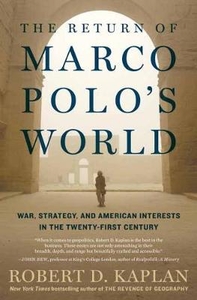-
Home
-
Contributors
-
International
-
Account
-
Information
More From Contributor
- & DCI Carol Jordan
- for the years he has spent in prison. Tony doesn`t know when Jacko will strike, or where. All he knows is that Jacko will cause him to feel fear like he has never known before
- & devastate his life in ways he cannot imagine... ...
- no longer content with their tiny planet
- ...

The Return Of Marco Polo`s World: War, Strategy, And American
Interests In The Twenty-first Century
Kaplan lays out a blueprint of the world`s changing power politics that recalls the late thirteenth century. As Europe fractures from changes in culture and migration, Eurasia coheres into a single conflict system. China is constructing a land bridge to Europe. Iran and India are trying to link the oil fields of Central Asia to the Indian Ocean. America`s ability to influence the power balance in Eurasia is declining.This is Kaplan`s first collection of essays since his classic The Coming Anarchy was published in 2000. Drawing on decades of firsthand experience as a foreign correspondent and military embed for The Atlantic, as well as encounters with preeminent realist thinkers, Kaplan outlines the timeless principles that should shape America`s role in a turbulent world: a respect for
the limits of Western-style democracy; a delineation between American interests and American values; an awareness of the psychological toll of warfare; a projection of power via a strong navy; and more.From Kaplan`s immediate thoughts on President Trump (”On Foreign Policy, Donald Trump Is No Realist, ” 2016) to a frank examination of what will happen in the event of war with North Korea (”When North Korea Falls, ” 2006), The Return of Marco Polo`s World is a vigorous and honest reckoning with the difficult choices the United States will face in the years ahead.
This page now acts as a permanent archive for this product. Add more information using the comments box below to ensure it can still be found by future generations.
Use our search facility to see if it is available from an alternative contributor.
- Availability: Out Of Stock
- Supplier: Stanfords
- SKU: 9780812996791
Product Description
A bracing assessment of U.S. foreign policy & world disorder over the past two decades, anchored by a major new Pentagon-commissioned essay about changing power dynamics among China, Eurasia, & America--from the renowned geopolitical analyst & bestselling author of The Revenge of Geography & The Coming Anarchy. In the late thirteenth century, Marco Polo began a decades-long trek from Venice to China. The strength of that Silk Road--the trade route between Europe & Asia--was a foundation of Kublai Khan`s sprawling empire. Now, in the early twenty-first century, the Chinese regime has proposed a l&-&-maritime Silk Road that duplicates exactly the route Marco Polo traveled. In the major lead essay, recently released by the Pentagon`s Office of Net Assessment, Robert D. Kaplan lays out a blueprint of the world`s changing power politics that recalls the late thirteenth century. As Europe fractures from changes in culture & migration, Eurasia coheres into a single conflict system. China is constructing a land bridge to Europe. Iran & India are trying to link the oil fields of Central Asia to the Indian Ocean. America`s ability to influence the power balance in Eurasia is declining. This is Kaplan`s first collection of essays since his classic The Coming Anarchy was published in 2000. Drawing on decades of firsthand experience as a foreign correspondent & military embed for The Atlantic, as well as encounters with preeminent realist thinkers, Kaplan outlines the timeless principles that should shape America`s role in a turbulent world: a respect for the limits of Western-style democracy; a delineation between American interests & American values; an awareness of the psychological toll of warfare; a projection of power via a strong navy; & more. From Kaplan`s immediate thoughts on President Trump (” On Foreign Policy, Donald Trump Is No Realist, ” 2016) to a frank examination of what will happen in the event of war with North Korea (” When North Korea Falls, ” 2006), The Return of Marco Polo`s World is a vigorous & honest reckoning with the difficult choices the United States will face in the years ahead.
Reviews/Comments
Add New
Intelligent Comparison
We couldn't find anything!
Perhaps this product's unique.... Or perhaps we are still looking for comparisons!
Click to bump this page and we'll hurry up.
Price History
Vouchers
Do you know a voucher code for this product or supplier? Add it to Insights for others to use.


 United Kingdom
United Kingdom
 France
France
 Germany
Germany
 Netherlands
Netherlands
 Sweden
Sweden
 USA
USA
 Italy
Italy
 Spain
Spain









 Denmark
Denmark